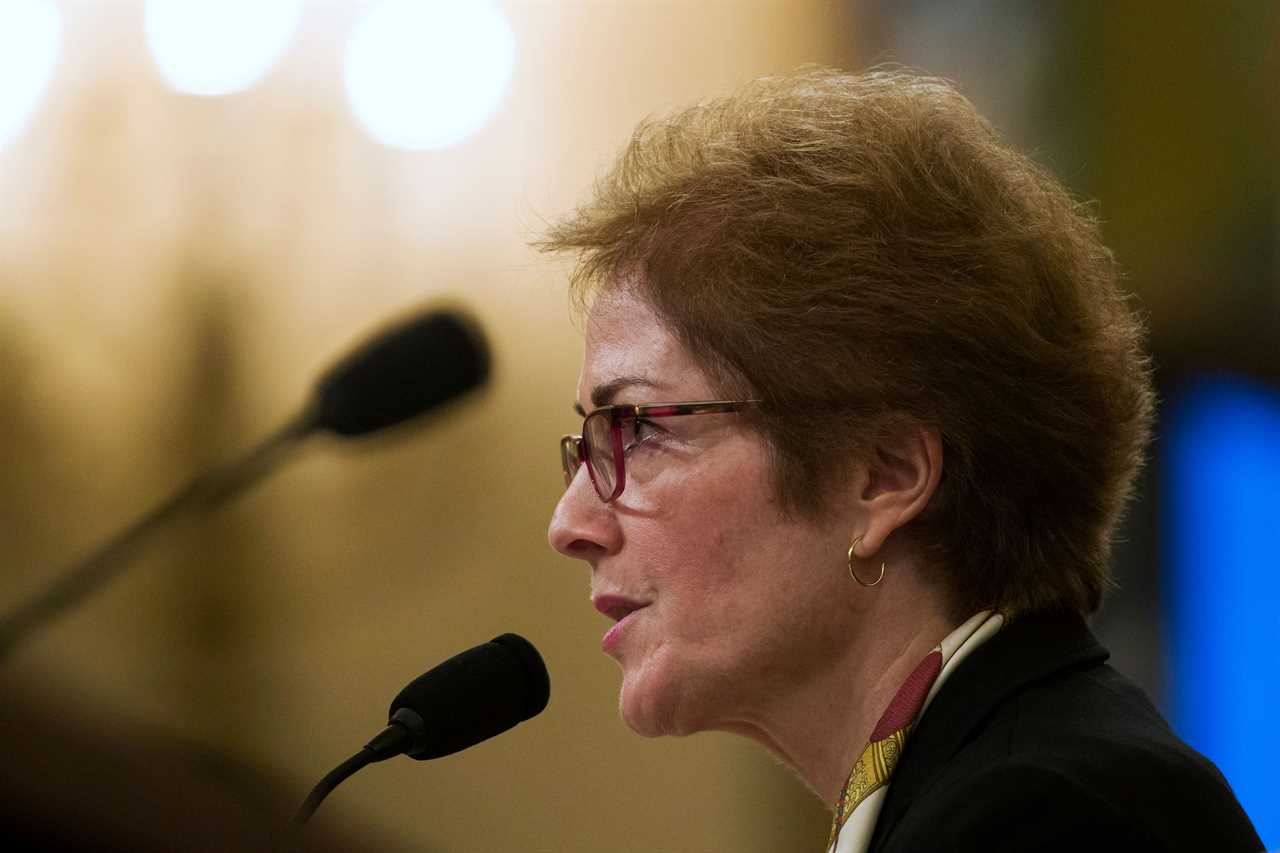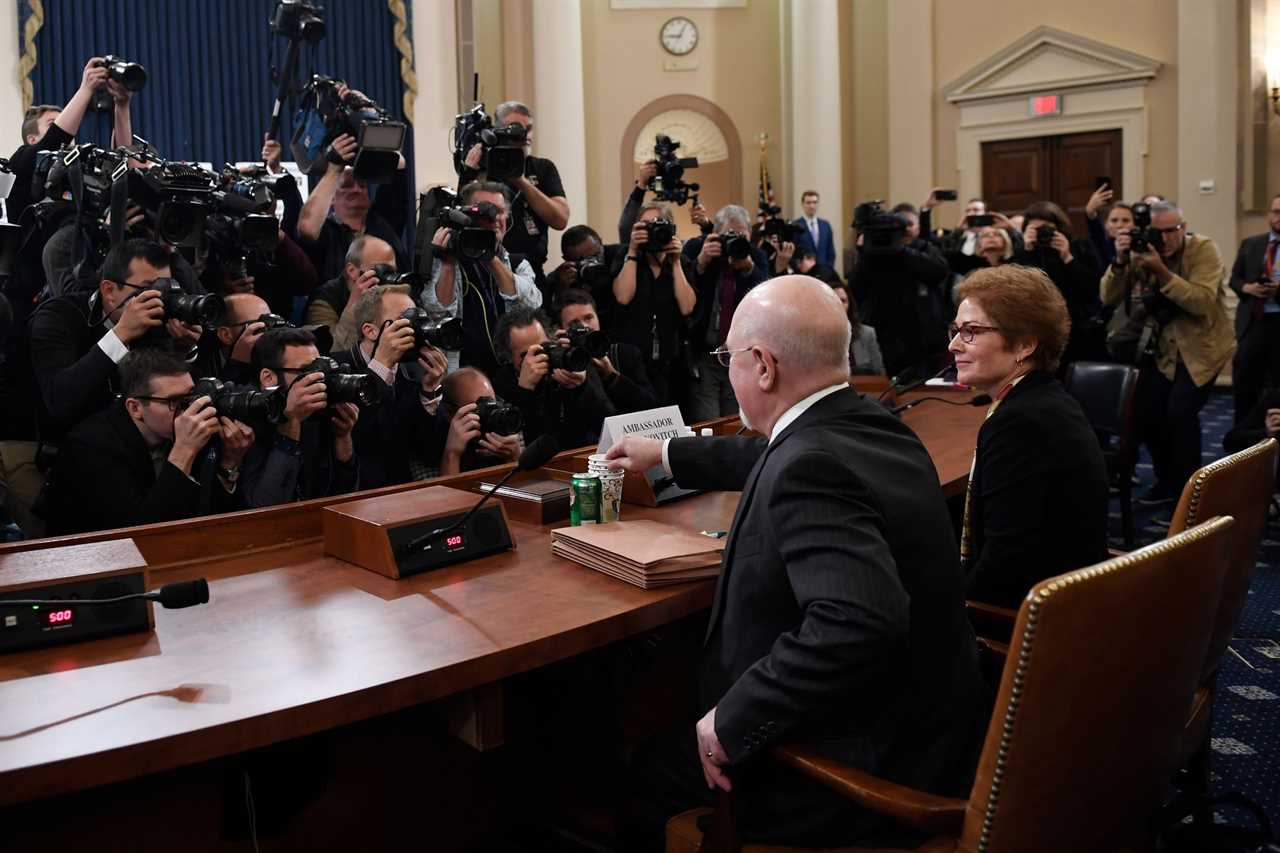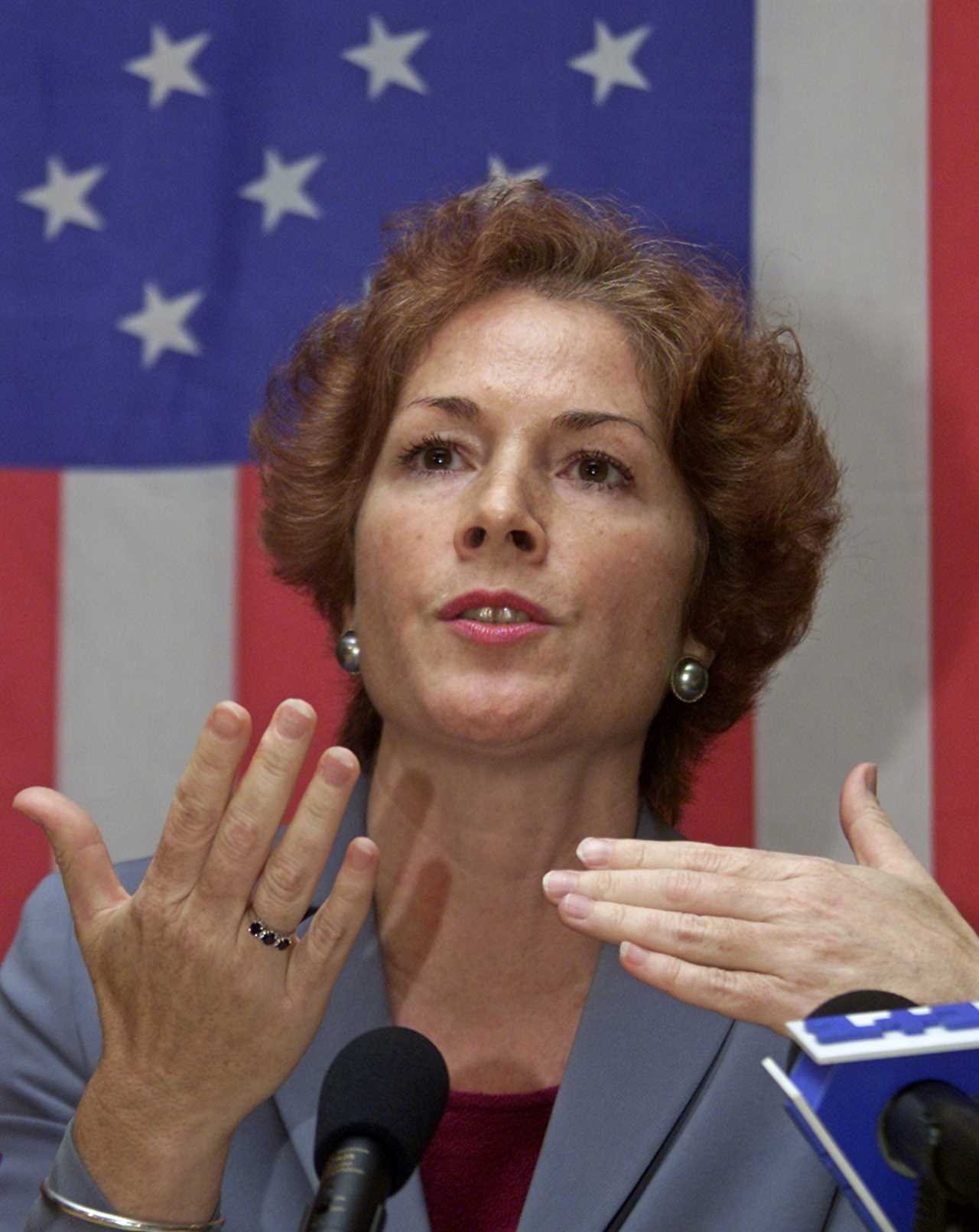
It’s been more than two years since then-President Donald Trump was acquitted by the Senate in his first impeachment, a scandal that was set off by a phone call between Trump and the new Ukrainian president, Volodymyr Zelenskyy, anxious about his country’s position in the crosshairs of an increasingly bellicose Vladimir Putin. We know how that call went: Zelenskyy wanted to buy more Javelin anti-tank missiles from the United States, and in exchange, Trump asked Zelenskyy to investigate Joe Biden’s son’s activities in the country. Now, the invasion of Ukraine has made clear why Zelenskyy spent the rest of the call appeasing Trump, even agreeing with Trump’s unwarranted attacks on Marie Yovanovitch, the former U.S. ambassador to Ukraine.
Now, Yovanovitch, whose firing was at the center of the first impeachment, might be the person with the most interesting insight into how we got from that moment to this one. “It was pretty clear to [Vladimir Putin] and pretty much everyone else that Trump didn’t really hold Ukraine in high regard,” she told me in an interview. “So I think if you’re President Putin, you’re getting much of what you need from a President Trump. When Trump lost the 2020 election, I think maybe Putin had to recalibrate and look for other means to achieve his goals.”
Yovanovitch is out with a new book, Lessons from the Edge: A Memoir","link":{"target":"NEW","attributes":[],"url":"https://www.amazon.com/Lessons-Edge-Memoir-Marie-Yovanovitch/dp/0358457548","_id":"0000017f-9238-d9f7-afff-b6bb05ef0001","_type":"33ac701a-72c1-316a-a3a5-13918cf384df"},"_id":"0000017f-9238-d9f7-afff-b6bb05ef0002","_type":"02ec1f82-5e56-3b8c-af6e-6fc7c8772266"}">Lessons from the Edge: A Memoir, about her three-decade-long career as a foreign service officer. She says she began writing it when Covid-19 upended everyone’s routines in early 2020, but she probably couldn’t have guessed that two years later, her experience in Ukraine would be urgent and valuable for an entirely new reason. I called her to discuss the new book, what she saw during her time in Ukraine that has made her think of the current conflict differently and how the impeachment has affected her life. “I’ve had a long career and I’ve done a lot of things throughout my life, some of which I’m proud of,” she said, “and I will always be remembered as the person who was fired by Trump.”
This conversation has been condensed and edited for clarity.
Katelyn Fossett: What has surprised you about the way the conflict in Ukraine has played out in recent weeks?
Marie Yovanovitch: I’m surprised by the performance of the Russian military. I had expected them to be more competent, and we’re not seeing that. I am not completely surprised, but I am heartened, by the international unity led by the U.S. and President Biden. I think it’s really important that we maintain a united front to support Ukraine and hold Russia accountable. And I think we’re doing a good job of that, although more needs to be done. And I guess the third thing is, having lived in Ukraine for six years, obviously I know the Ukrainian people and know that they would resist this. But they have done that with success and with the spirit that has not only held that country together and pushed back on the Russians in meaningful ways but also inspired the world. And I think that is a little bit surprising and deeply satisfying.
Fossett: As you’re watching, have you been thinking about how any of the issues surrounding your removal and the hold on aid and the first Trump impeachment are relevant to what is happening?
Yovanovitch: Well, I think the “perfect” phone call revealed that Trump personally was ready to trade our national security interests for a personal favor.
To the point of your question, I think that phone conversation where he was using Ukraine as a pawn for his own personal goals, he signaled to bad actors everywhere, including to Putin, that you can make unsavory deals with Trump, and that you can find a way to get him to say yes if you appeal to his vanity, his pocketbook or his personal needs in one way or another. And I think that disdain for Ukraine really kind of emboldened Putin. I mean, during the Trump administration, I think Putin was getting what he wanted: While U.S. official policy was strong, it was pretty clear to him and pretty much everyone else that Trump didn’t really hold Ukraine in high regard, to the extent that he even thought about Ukraine. Trump made clear his disdain for NATO and some of the allies. So I think if you’re President Putin, you’re getting much of what you need from a President Trump. When Trump lost the 2020 election, I think maybe Putin had to recalibrate and look for other means to achieve his goals.

Fossett: And do you think there is something that the U.S. could have or should have done differently to head off what we’re seeing now?
Yovanovitch: Well, I think, you know, in retrospect, I think many in the foreign policy community had wanted to provide Javelins to Ukraine much earlier. And I think we probably should have, and we should have strengthened and bolstered the train-and-equip program we had in Ukraine.
Fossett: Did you ever meet Zelenskyy during your time in Ukraine?
Yovanovitch: I met him a number of times before he was a candidate and then when he was a candidate for president. And that would have been in the fall of 2018, and in the winter or early spring of 2019, right before he became president.
Fossett: What was your impression of him? And what do you think the Ukrainians saw in him that a lot of other people, who saw him as an unserious candidate or ill-suited to the job, didn’t?
Yovanovitch: He is obviously a funny guy — he’s a hugely successful comedian — but in the first meeting I had with him, he was eager to present himself as a businessperson, as somebody who had built a multimillion-dollar entertainment conglomerate that was immensely successful, not just in Ukraine, but throughout the Russian-speaking world, including Russia, Israel and other places. He was a really successful and beloved entertainer, and he was trusted by the Ukrainian people. And I think the reason that he wanted to share that with Americans was he wanted to let us know that he has executive skills.
Moreover, he was running on a pretty simple platform, and it was getting control of corruption and bringing peace to Ukraine. And that really resonated with the Ukrainian people.
Ukrainians wanted the rule of law, and while Ukraine made significant progress in reform and anti-corruption efforts after the 2014 Revolution of Dignity — that term means rule of law, by the way, that there is one law for all people — as always, things go in fits and starts, and things slow down a little. People were frustrated. And so they went to the protest candidate, and that was Zelenskyy. And he won. In the second round of elections, which has the top two contenders from the first round, he got something like 73 percent of votes.
Historically, since independence in Ukraine, the vote has been divided between east and west. In this election, Zelenskyy won a majority in every single oblast. So it was really remarkable; he was not the eastern candidate or the western candidate. He was Ukraine’s candidate.
Every president struggles with challenges. And Zelenskyy is no exception. But the man has met the moment; he has really emerged as a wartime president. At the critical moment in this country’s history, not only uniting Ukrainians, but inspiring a world.
Fossett: Have you have you thought at all about the transformation of U.S. or Western attitudes toward Ukraine? We really saw this during the impeachment, but Ukraine has often been seen as this deeply corrupt place. And now, you know, it’s the avatar of democracy. A lot of people are cheering the country on. I’m wondering what you make of that shift.
Yovanovitch: Well, it was never the most corrupt country in the world. Did Ukraine have a pretty serious corruption problem? Yes, it did, like pretty much every country in the former Soviet Union, including Russia, although of course, there, you can’t talk about. I think part of the reason that we focus on that corruption here in the west is because the Ukrainians themselves are talking about it. In 2014, they said, “Enough. We want to end corruption; we want rule of law.” And that opened the whole discussion and made it possible for the change to take place.
So on one hand, they should get great credit for that. But they’re also being stigmatized as this very corrupt country because they’re trying to do something about it. It’s really ironic to me. And, regarding the democracy part of your question, I mean, Ukrainians, they are freedom-loving people. [Laughs.] That’s the only way to put it; they always have been, and they voted for independence with well over 90 percent of the vote back in 1991. They don’t want us to tell them what to do, and they certainly don’t want Russia to tell them what to do. They’re kind of unruly and they’re going to forge their own path. And that path is for freedom, to be their own country and to live by the rule of law in a liberal democracy.
I don’t think most Ukrainians would use those terms, just as most Americans wouldn’t, either. But they want good jobs for themselves, a future for their kids and they want to be treated with dignity. And they started looking West, because if you look East to the Russian model, you really don’t get any of those things. It’s kind of a bankrupt model.
Fossett: Do you think there is a fitting historical parallel for Putin’s invasion of Ukraine?
Yovanovitch: Russia is a historically expansionist country, and if you look at the map over time, it keeps on pushing out, creating more space between its capital Moscow and any border areas. When we look at Putin’s rule, first of all, there’s the brutality of Chechnya and Syria. But there’s also nibbling off parts of Georgia in 2008 and then Ukraine in 2014, when he illegally annexed Crimea and invaded parts of the Donbas area as well. And he got away with all of that. There was some criticism in 2014, and there were some sanctions. But he got away with it. And so now he’s doing it again. And I think that what we need to understand is that if he gets away with it again, he’s not going to stop.
Fossett: So what do you think the appropriate U.S. response is?
Yovanovitch: The first thing I would say is, I think the Biden administration is doing a really good job of keeping allies and partners united, working closely with Ukraine and piling on the sanctions. Sanctions generally take a long time to work, but you can see there’s immediate pain in Russian society. It’s very sad for the Russian people, but hopefully at some point it will be persuasive to Vladimir Putin. So I think that’s all good, as well as flowing arms and equipment to Ukraine at hyperspeed; things that usually take months, if not years, to move through the system. It’s been weeks, even less in some cases, and that is really impressive. But I think we still need to do more.
I think we can’t take items off the table. I think we need to look really hard at what kind of defensive systems we can be providing Ukraine. I mean, obviously Ukraine would love us to join the fight with American boots on the ground. But they have said, “If you can’t do that, just give us the equipment and we will fight this fight and we’ll fight it for you, too, because this is about democracy versus tyranny.” I think we need to keep on sending in support as quickly as we can, because we’ve seen over the last day or so Russia has started to attack the western side of Ukraine.
To put maybe a finer point on it, we can’t let Putin set the conditions for this war. Russia is the aggressor. They have invaded a peaceful nation, and that is simply wrong. And what history has shown us is that if we don’t push back, Russia will keep on going.
The bottom line is if this fight is our fight — because that’s something else we often hear, and something I happen to believe to be true — and it’s a struggle between freedom and tyranny, then our actions need to more closely match that rhetoric. Rhetoric is good, but I think we need to keep on looking for what more we can do as conditions on the ground change and as more people are murdered.
Fossett: How did the impeachment testimony affect your life?
Yovanovitch: I’ve had a long career and I’ve done a lot of things throughout my life, some of which I’m proud of, and I will always be remembered as the person who was fired by Trump, or the ousted ambassador. There were many headlines about it. And I’d like to be remembered for my career and the positive impact that I had in the countries where I served and on U.S. foreign policy.

Fossett: Do you think that this current conflict between Russia and Ukraine would have happened without a President Trump?
Yovanovitch: It’s really hard to know. I do think that Putin has an obsession with Ukraine. But I also, you know, when I was serving in Ukraine, the second time as ambassador, I never really thought that Putin wanted to, quote, “own” Ukraine. Because if you invade a country and take it over, you have to provide services and you’ve got to govern in some way, even if you’re a dictator. And that would mean resources that would be taken away from the Russian people and the development of Russia — assuming, of course, that you think Putin cares about that sort of thing — but it’s diverting resources to something else.
And I thought he had gotten what he wanted by just maintaining this low-level war in the Donbas, which didn’t garner headlines in the West. But every week, a couple of Ukrainian soldiers or civilians died in the country; I mean, that’s a hot war right in the middle of Europe. And it was destabilizing. Add to that a campaign of assassinations against senior level Ukrainian officials, disinformation and multiple cyber-attacks. Putin was doing a pretty good job of destabilizing Ukraine and making it hard to govern. And I had thought that was enough, but apparently not.
I do think that when Zelenskyy was elected, that Putin thought that he could run circles around Zelenskyy. And that turned out not to be true. As Russia squeezed Zelenskyy a little bit more, Zelenskyy became much more pro-West than he had been when he entered office, culminating in wanting to join the EU and join NATO. And so that wasn’t working the way Putin had wanted. So I think there are a variety of factors, and I think it’s hard to answer a hypothetical.
Fossett: Is there anything about how those events played out in 2019, from your removal through the impeachment, that you still have questions about or you feel like you haven’t gotten answers to?
Yovanovitch: You know, I think there are a lot of issues, because with every book that comes out, we’re finding out more about the Trump years. When it was all happening to me, it wasn’t like anybody was coming to me and explaining what was happening. There was this general swirl of all the rumors and Ukrainian officials coming to me quietly saying, “You have to watch your back ... Rudy Giuliani and Yuriy Lutsenko [then the Ukrainian prosecutor-general] have hooked up, and they are going to hurt you.” But when I would call back to Washington and say, “What’s going on? Are there concerns? Do I need to do something differently?,” everyone was like, “Oh no, everything’s fine!” In Washington, there are rumors, but you kind of have to just put that aside and you keep on doing the work. So I expect there will be more details forthcoming.
----------------------------------------
By: Katelyn Fossett
Title: ‘I Will Always Be Remembered as the Person Who Was Fired by Trump’
Sourced From: www.politico.com/news/magazine/2022/03/16/fired-by-trump-putin-yovanovitch-00017549
Published Date: Wed, 16 Mar 2022 03:30:00 EST
Did you miss our previous article...
https://consumernewsnetwork.com/politics-us/governors-urge-lower-taxes-after-gas-price-rise






